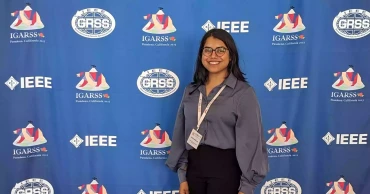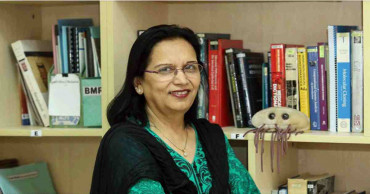Bangladeshi scientist
Bangladeshi imaging scientist Nayma shines on global stage
Nayma Binte Nur, a Bangladeshi imaging scientist who is affiliated with the Rochester Institute of Technology (RIT), is having her moment of glory in the global scientific community.
Nayma’s expertise lies in hyperspectral remote sensing and radiative transfer modeling, sophisticated techniques allowing her to unravel Earth’s systems’ complexities. In simple terms, she’s decoding the mysteries of the planet by studying how light interacts with its surface.
3 scientists win Nobel Prize in physics for looking at electrons in atoms during split seconds
One of Nayma's key focuses is soil moisture, a crucial factor influencing a wide range of ecological systems and affecting everything from agriculture to flood forecasts. Using advanced imaging methods, Nayma accurately determines soil moisture levels and extends her findings across vast areas using satellite imagery, showcasing the broad applicability of her work.
This ground-breaking approach has garnered the attention of prestigious scientific organizations, including NASA. In preparation for their upcoming Surface Biology and Geology (SBG) mission, NASA has highlighted Nayma’s work in a special collection, underscoring its potential influence.
ISRO Chandrayaan-3: 9 Women Scientists Who Led India’s Moon Landing
Nayma’s exceptional research does not end with NASA’s SBG mission; it has been showcased at prominent events hosted by NASA’s Jet Propulsion Laboratory and Planet Labs PBC. The scientific community commended her for her contributions and unique skill set, which are poised to drive significant breakthroughs, particularly in using light to reveal intricate details about organic matter in soil across extensive geographic regions.
Scientists board India’s research vessel ‘Sagar Nidhi’ for 35-day expedition
Nayma’s educational journey included an Electrical and Electronic Engineering degree from Khulna University of Engineering and Technology (KUET), enriched by advanced mathematics studies at Jahangirnagar University, which provided a sturdy foundation for her forays into imaging science.
2 years ago
Dr Gawsia and Dr Senjuti from Bangladesh among top 100 Asian scientists
Two Bangladeshi scientists have made it to the 2023 list of the "best and brightest" 100 Asian scientists for their contribution to research.
Child Health Research Foundation’s Dr Senjuti Saha and Dhaka University’s Dr Gawsia Wahidunnessa Chowdhury have been included in the eighth edition of the list published by Singapore-based magazine Asian Scientist.
This year’s list includes researchers and inventors from across a range of scientific disciplines for their groundbreaking achievements to transform our world -- from understanding glacial cycles and structural geology to advancing space exploration.
Also read: The ecosystem engineers that can filter Dhanmondi Lake’s water within 21 hours
“Asia’s researchers continue to dream big and serve marginalized communities. Pushing the boundaries of the unknown, the awardees, with the help of their teams, accomplished huge successes,” the Asian Scientist Magazine said in a press release.
Dr Gawsia Wahidunnessa Chowdhury has been included in the list for her contribution in the field of sustainability.
Dr Chowdhury is a professor of zoology at the University of Dhaka. She obtained her PhD in zoology (wetland ecology) from the University of Cambridge. She is a board member of the internationally renowned conservation organization WildTeam. WildTeam works to protect the rapidly disappearing natural assets of Bangladesh.
Also read: OWSD-Elsevier Foundation Award: Bangladesh's Gawsia among top women climate scientists
Dr Chowdhury won the OWSD-Elsevier Foundation Award in 2022 for her contributions to conserving aquatic ecosystems and vulnerable species in Bangladesh. She focuses on the risk of plastic pollution in the country’s waterways. She is also empowering women from poor and marginalized communities to turn discarded fishing nets into products such as carpets to help create alternative sources of income for women while protecting aquatic habitats.
Meanwhile, Dr Senjuti Saha, one of the leading young scientists in Bangladesh who has been championing the cause of equity in global health research, has been included in the list for her contribution to life sciences.
She was the first in the world to show that the chikungunya virus could cross the blood-brain barrier and cause meningitis in Bangladeshi children.
Also read: Bangladeshi scientist Senjuti Saha made member of WHO board
She has won multiple domestic and international awards for her contribution to medical science research including Women of Inspiration 2021 Award by Junior Chamber International, Bangladesh and Webby Award in 2020 for Infectious Disease Detectives (with Chan Zuckerberg Initiative).
Dr Saha is also a member of the Polio Transition Independent Monitoring Board (TIMB), created by the Global Polio Eradication Initiative led by the World Health Organization.
Scientists from China, India, Malaysia, Pakistan, Singapore, Japan, South Korea, the Philippines, Hong Kong, Sri Lanka, Indonesia, Thailand and Vietnam have also secured their place on the prestigious list.
Also read: 13 get 'Woman of Inspiration Award 2021'
2 years ago
OWSD-Elsevier Foundation Award: Bangladesh's Gawsia among top women climate scientists
Bangladesh's Gawsia Wahidunnessa Chowdhury and five more researchers have been awarded the 2022 OWSD-Elsevier Foundation Award for early-career women scientists in the developing world.
The award is a recognition of their contributions to research that is helping tackle climate change and advancing the UN Sustainable Development Goals (SDGs) including SDG13 (Climate Action), SDG14 (Life Below Water) and SDG15 (Life on Land).
The winners' research explores a wide range of environmental impacts and their potential solutions: from turning waste into man-made soil; transforming plastic pollution into viable products for community trade; harnessing the power of microbes to improve carbon storage and soil quality; and using the right types of plants with roots to help prevent soil erosion and encourage soil "plasticity."
Dr Gawsia, professor of zoology at the University of Dhaka (DU), has won the award in biological systems and organisms for her work on the conservation of aquatic ecosystems and threatened species in Bangladesh.
Also read: Bangladeshi companies get most Safa awards
Her work focuses on assessing the extent of and the risks from plastic pollution, which is closely linked to climate change. Microplastics and other plastics enter the waterways in Bangladesh from fishing nets, among other sources, and are harmful to threatened species and habitats.
The prize also acknowledges the scientists' commitment to leadership, mentoring and engagement within their communities, including the use of innovative technologies in their research.
Dr Gawsia is leading an effort to educate women in poor and marginalised fishing communities about how discarded Nylon-6 fishing nets can be turned into value-added products such as carpets and clothing, creating an alternative income source for the communities while protecting the wetland habitats.
"Winning this award is like a promise to continue my research and teaching with new hope. This award gives me a scope to prove what women in science and conservation can achieve while working hard with sincere commitment," Gawsia said.
"I believe this award will inspire my daughter, my students and everyone here in Bangladesh to showcase that with different limitations, scientific research can be done and achieved recognition worldwide."
Dr Gawsia received her bachelor's and master's degrees in zoology from DU in 2003 and 2005. She was awarded the prestigious Commonwealth Academic Staff Scholarship to study for her PhD in zoology at the University of Cambridge, which she completed in 2012.
Since 2013, the researcher has worked at DU, teaching animal diversity, wetland ecology and other topics in zoology. She has received many awards and grants, including the Wildlife Conservation Society Fellowship.
Dr Gawsia is a board member of the conservation organisation WildTeam and a member of the Zoological Society of Bangladesh and has been appointed regional co-chair of the South Asian Invertebrate Specialist Group of the International Union for Conservation of Nature.
The scientist was the country lead for the National Geographic "Sea to Source: Ganges" expedition in 2019-2020.
Also read: Climate Conscious Architecture: Bangladesh’s Rainwater-harvesting Hospital Wins International Award
She aspires to get more women engaged in science education and conservation efforts in Bangladesh and to make scientific findings understandable to the public.
The other researchers who have won the award are Myriam Mujawamariya of the University of Rwanda in biological systems and organisms, Abeer Ahmed Qaed Ahmed of the Al-Saeed University in biological systems and organisms, Heyddy Calderon of the Instituto de Geología y Geofísica in engineering sciences, Ashani Ssavinda Ranathunga of the University of Moratuwa in engineering sciences, and Flor de Mayo Gonzalez Miranda of San Carlos University in engineering sciences.
"What our 2022 winners are doing is absolutely outstanding. Climate change is the most pressing challenge of our time, and these women are finding innovative and effective ways to address it in their local contexts. We hope this award is the first of many for them," Jennifer Thomson, president of the Organization for Women in Science for the Developing World (OWSD), said.
First awarded in 2013, the award is given in partnership by the OWSD and the Elsevier Foundation.
The OWSD chairs a panel of distinguished scientists to select the winners, and the foundation awards a cash prize for each winner of $5,000, as well as an all-expenses-paid trip to attend a prominent scientific gathering to provide them with vital networking opportunities.
This year's award ceremony will take place on March 24, both virtually and in-person as part of the International Conference on Gender Action and Climate Change in Turkey at the Istanbul Aydin University.
Ylann Schemm, director of the Elsevier Foundation said: "We have reshaped our award this year to respond to the key challenges of our time, such as climate change, and supporting the progress being made around the UN SDGs."
"We know that a quarter of all women are engaged in agriculture, which makes them more vulnerable to both climate change and resource scarcity. We want to reflect the critical role that women can play in successfully addressing climate shifts."
4 years ago
Dr Firdausi Qadri: Ramon Magsaysay 2021 Award Winner Bangladeshi Scientist
Dr Firdausi Qadri, a Bangladeshi scientist won the Ramon Magsaysay Award 2021, which is known as Asia’s Nobel Prize. Dr Firdausi has been honored with this prestigious award due to her magnificent contribution to infectious disease control, immunology, vaccine development, and clinical trials. This article will present a brief about Dr Firdausi Qadri, her journey as a researcher, and her achievement of the Ramon Magsaysay Award.
Who is Dr Firdausi Qadri?
Emeritus Scientist for infectious diseases Dr Firdausi Qadri was born on March 31, 1951. She obtained her BSc in 1975 and MSc in 1977 from the Department of Biochemistry and Molecular Biology, University of Dhaka. Later she received her Ph.D. in 1980 from the Department of Biochemistry/ Immunology, University of Liverpool, UK.
After completing post-doctoral research from International Centre For Diarrhoeal Disease Research, Bangladesh’s (icddr,b) Department of Immunology, she joined the same institute in 1988 as an associate scientist. Firdausi was later appointed as a senior scientist and head of the Department of Mucosal Immunology and Vaccinology at the same institution. Currently, Firdausi Qadri is working as Emeritus Scientist at icddr,b.
Read Dr Qadri wins Magsaysay Award for developing life-saving vaccines
In the early years of her career, this Bangladeshi scientist has been working on research related to medicine. She played a leading role in specializing in such research activities. Firdausi has worked on the cholera vaccine development for about 25 years. She also specializes in ETEC, typhoid, Helicobacter pylori, rotavirus, and other infectious diseases.
Qadri has an important contribution to the development of the typhoid vaccine for children and the elderly. Besides these, she contributed to the development of a remedy for this disease for 9-month-old newborns.
Honors and rewards
In 2008, Firdausi was awarded the Gold Medal of the Bangladesh Academy of Sciences. In 2002, she won the Christophe Merieux Prize for her research on infectious intestinal diseases in developing countries. In 2013, she received the annual C. N. R. Rao award from the world academy of sciences for her advancements in science in developing countries.
READ: Dr Firdausi Qadri’s Magsaysay: Fitting recognition for a pioneering life’s work
In 2014, Dr. Firdausi Qadri was appointed as a consultant to a high-level panel to make the UN-proposed technology bank and the systems supporting science and innovation more efficient organizationally. She was the first person in South Asia to receive a Grand Prize from the Christoph and Rudolph Foundation. In 2012, icddr,b recognized Qadri as the best female employee of the year.
She received the L'Oreal-UNESCO Women in Science Award (Asia-Pacific Region) in 2020 for her significant contribution to the identification of infectious diseases in developing countries and the prevention of their spread worldwide.
In 2013, Qadri received Ananya's top 10 awards. Further, in 2021, Asian Scientist Magazines, a Singapore-based science magazine included her in the list of the 100 best scientists in Asia. Ferdousi is also a member of the Academy of Sciences of Bangladesh and the International Ambassador of Bangladesh American Society for Microbiology.
Read Safwan Sobhan receives AsiaOne Magazine's 'Asia's Greatest Leader' award
4 years ago
Dr Qadri wins Magsaysay Award for developing life-saving vaccines
Bangladeshi scientist Dr Firdausi Qadri has been named for the prestigious Ramon Magsaysay Award for being instrumental "in developing vaccines that have saved millions of lives".
The 70-year-old will be formally conferred the award -- the Asian equivalent of the Nobel -- at a ceremony on 28 November 2021, at the Ramon Magsaysay Center in Manila.
Read:BINA and scientist Dr Shamsun Nahar receive prestigious IAEA awards
Dr Qadri was born to a middle-class family in Bangladesh that encouraged women to pursue an education and a career.
She decided to specialise in medical research, earning a degree in biochemistry. Dr Qadri went on to earn a doctorate from Liverpool University in the United Kingdom.
Set on working in her homeland, she taught at a local university and in 1988, joined the International Centre For Diarrhoeal Disease Research, Bangladesh (icddr,b), a global health research institute based in Dhaka.
4 years ago
3 Bangladeshi women make it to list of top 100 Asian scientists
Three Bangladeshi scientists, all of them women, have made it to the list of "best and brightest" 100 Asian scientists for their contribution to research.
International Centre for Diarrhoeal Disease Research Bangladesh's Dr Firdausi Qadri, Model Livestock Advancement Foundation's Dr Salma Sultana, and Bangladesh University of Engineering and Technology's Professor Saima Subrina have been included in the sixth edition of the list published by Singapore-based magazine Asian Scientist.
Read Legendary Women in Bangladesh with Pioneering Contribution in Diverse Fields
Scientists from China, India, Malaysia, Singapore, Japan, South Korea, the Philippines, Hong Kong, Sri Lanka, Indonesia, Thailand and Vietnam have also secured a place on the prestigious list.
Researchers and inventors from across a range of scientific disciplines have been picked based on their role in tackling this year's key challenges, including Covid-19 and climate change, said Asian Scientist.
Read 2 Bangladeshi women named in BBC 100 Women 2020 list
All three Bangladeshi scientists previously received an international award for their leadership and role in effective discovery.
Dr Firdausi, an emeritus scientist at icddr,b, won the L'Oréal-Unesco for Women in Science Award 2020 for her work on understanding and preventing infectious diseases affecting children in developing countries and advocacy for early diagnosis and global vaccination.
Read Bangladeshi young medical scientist shines in Japan
Dr Salma, the founder of Model Livestock Advancement Foundation, previously won the Norman E Borlaug Award 2020 for field research and application by the World Food Prize Foundation for her work with Bangladeshi small-scale farmers – namely her efforts involving veterinary outreach, treatment, and education.
Professor Samia received the OWSD-Elsevier Foundation Award 2020 for Early-Career Women Scientists in the Developing World for her research on the properties and uses of nanomaterials.
Read Women continue making amazing contributions in STEM fields.
4 years ago
Bangladeshi scientist Senjuti Saha made member of WHO board
Dr Senjuti Saha, a scientist of the Child Health Research Foundation in Bangladesh, was appointed as a member of the Polio Transition Independent Monitoring Board (TIMB) of the World Health Organization (WHO).
5 years ago


.jpg)


.jpg)
.jpg)


